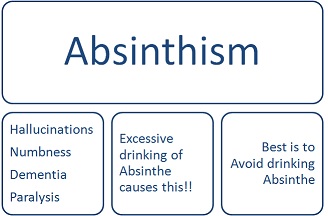Absinthism
TweetAbsinthism is disorder which is caused by excess use of absinthe. Absinthism is describe in 19th and 20th century which causes to the mental disorder. It is manufactured from wormwood herbs and commercialized and popularized in France in the late 1700s by Henri-Louis Pernod. Absinthe is bitter in taste and it is drank after adding some sugar and excess drinking causes to the absinthism. The absinthism is a condition which is caused by excessive drinking of absinthe that is alcoholic liqueur. It is a drug like a pain killer which pleasant mood. The high doses will causes the hallucinations. It causes to the convulsions, hallucinations, and mental deterioration. Only 1% persons were found symptoms of absinthism.
Symptoms of Absinthism
The symptoms of the absinthism are as follows
- Hallucinations
- Facial contractions
- Numbness
- Dementia.
- Sleeplessness
- Tremors
- Restlessness
- Paralysis
- Hyperexcitability
- Memory loss

Cause of Absinthism
- Dry skin causes to the absinthism.
- It causes due to excessive drinking of absinthe.
- Absinthism causes to the brain damage.
Prevention of Absinthism
- Avoid long consumption of absinthe


Sometimes crying or laughing
are the only options left,
and laughing feels better right now.

Current Issue
 Self Help Leaflets Take the help of our self help leaflets or booklets. |
 The DG Magazine All about living with depression |
Most Read on Disorders
Somatoform Disorders
Somatization Disorder
Conversion Disorder
Undifferentiated Somatoform Disorder
Hypochondriasis
Pain Disorder
Somatoform Disorder NOS
Body Dysmorphic Disorder
Factitious Disorders
Malingering
Munchausen Syndrome
Munchausen Syndrome by Proxy
Cognitive Disorders
Mental Retardation
Parkinson's Disease
Parkinsons-Dementia
Amnestic Disorder
Huntington's Disease
Learning Disorders
Attention Deficit Hyperactivity Disorder (ADHD)
Dyslexia
Trauma Disorders
Adjustment Disorder
Childhood PTSD
Depersonalization Disorder
Dissociative Identity Disorder (DID)
Disruptive Behavior Disorders
Conduct Disorder
Disruptive Behavior Disorder NOS
Oppositional Defiant Disorder (ODD)
Psychotic Disorder
Delusional Disorder
Brief Psychotic Disorder
Schizoaffective Disorder
Shared Psychotic Disorder
Dementia
Schizophreniform
Dissociative Disorders
Dissociative Amnesia
Dissociative Fugue
Depersonalization Disorder
Dissociative Disorder NOS
Psychiatric Disorder
Mutism
Aphonia
Schizophrenia
Paranoia
Organic mental disorders
Other Disorders
Hyperventilation Syndrome and panic diosrder
Psychosomatic Disorder
Rett's Syndrome
Hypochondriasis
Schizophrenia Treatment Study
Schizophrenia Treatment Study Results
Clozapin Side Effects












